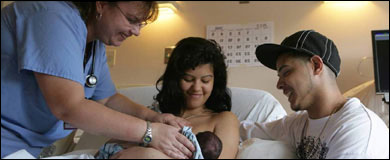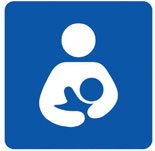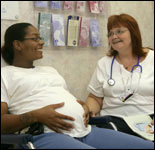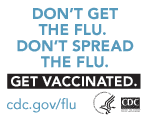Measuring Breastfeeding Support across the US
 States can use data from the CDC Breastfeeding Report Card to determine ways to improve how they protect, promote, and support breastfeeding to improve lifelong maternal and child health statewide.
States can use data from the CDC Breastfeeding Report Card to determine ways to improve how they protect, promote, and support breastfeeding to improve lifelong maternal and child health statewide.
The 2008 Breastfeeding Report Card is now available! The Report Card provides information for each state on key breastfeeding indicators. It helps show where a state has been successful and where more work is needed in order to improve breastfeeding practices.
What is Reported in the Breastfeeding Report Card
Fourteen breastfeeding indicators are reported for each state and for the U.S. overall in the 2008 Breastfeeding Report Card. These indicators allow for easy state-by-state comparisons and help show where a state has been successful and where more work is needed.

- The national goals for breastfeeding are outlined in the federal initiative known as Healthy People 2010 [see Maternal, Infant and Child Health]. Indicators for each goal measure initiation – how many mothers start breastfeeding; duration – the number of months breastfeeding continues; and exclusivity – how old babies are when they start having any foods or liquids other than breast milk.
- Many types of support make it easier for mothers to choose to breastfeed and also to get started and continue breastfeeding. The Report Card includes indicators of birth facility support; support from health professionals; support from other mothers; state legislation; and public health infrastructure (public facilities and services).
What Does the Breastfeeding Report Card Show?

The 2008 Breastfeeding Report Card shows that more work can be done to help protect, promote and support breastfeeding. Few states have achieved all five Healthy People 2010 objectives for breastfeeding. Although almost all support indicators showed small increases in 2008 from 2007, the levels of support remain low and could be increased much more.
People working in states that want to improve breastfeeding support can turn to The CDC Guide to Breastfeeding Interventions for help in deciding what type of evidence-based intervention best meets their needs.
How Long Should Infants be Breastfed?

Infants need nothing more than breast milk for about the first 6 months of life for optimal growth and development, with rare exceptions. Therefore, health experts recommend exclusive breastfeeding, meaning that infants receive no additional foods or liquids, during this time.
Breastfeeding continues to provide important nutrition and protection from illness and infection beyond the first 6 months of life. In fact, there is no specific age when breastfeeding necessarily should stop. Instead, health experts suggest minimums for breastfeeding and encourage mothers to continue breastfeeding beyond these minimums for as long as needed. For example, the US Surgeon General and the American Academy of Pediatrics (AAP) recommend that breastfeeding continue at least 12 months. (See HHS Blueprint for Action on Breastfeeding, and AAP's Breastfeeding and the Use of Human Milk.) The American Academy of Family Physicians (AAFP) and the World Health Organization recommend breastfeeding at least 2 years. (See AAFP Breastfeeding Policy Statement and World Health Organization's Infant Feeding Recommendation.)
For More Information
- CDC Breastfeeding – providing information and resources related to CDC’s evidence-based policy and environmental approach to breastfeeding protection, promotion, and support.
- US Breastfeeding Committee (USBC)* – a national organization working to improve the nation's health by promoting and supporting breastfeeding.


